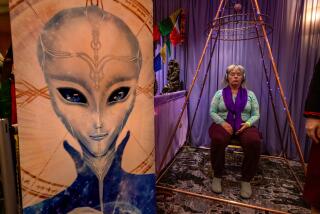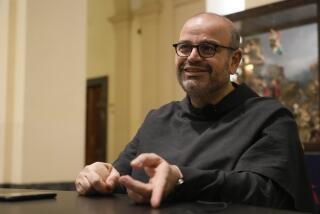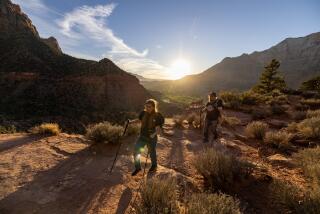Exploring Spirituality in a Material World at UCI
- Share via
Shoshana Phoenixx, a Jewish chaplain at a Northern California hospice, flew from Oakland to ask one of the better questions Sunday at the seventh annual Religious Diversity Faire at UC Irvine:
How do you resolve conflicts between doctors and their patients when their ethics, morals and even professional codes conflict?
She lives with the dilemma daily, watching dying patients and caring doctors collide when religious values and medical practices differ.
And who better to ask than a panel of experts from a medical technology and ethics workshop? The seminar was one of nine offered during the fair, which had the theme “Religion and Spirituality in a High-Tech World” and drew 400 people to UCI.
The scientists and ethicists listened to her query, looked at one another, but could only shrug.
“I do not have an answer,” said Dr. Paul Silverman, who worked on the development of the first national Human Genome Center at UC Berkeley.
“I don’t know if I have an answer either,” conceded Michael Trevitt, who serves on the ethics committee at St. Joseph Hospital in Orange.
Phoenixx later said she appreciated the panelists’ candor.
“They are trying to look at some of these really hard problems of medical ethics,” said Phoenixx, who noted that only her question stumped the panelists. “I liked that people had opinions. They were honest.”
Besides attending the workshops on medical ethics and religion, Phoenixx spent her day at UCI connecting with other health care professionals who deal with the prospect of death every day.
“I want to network with people who are making these same decisions I am,” Phoenixx said.
She also collected religious literature from conference exhibitors to help her guide terminally ill patients through their final days.
“Today, not many people are dyed-in-the-wool about their religion,” Phoenixx said. “I’m here doing research for myself and for them so I can support them, honor them. You’re a Quaker? OK, here’s something to read.”
In addition to Quakers, the fair attracted other Christians, Muslims, Buddhists, Jews, Native Americans, Bahais, Hindus and New Age spiritualists.
The interfaith conference was started in 1994 by Aliso Viejo Rabbi Allen Krause, who felt Orange County’s religious groups were too insular.
“Everyone stayed to themselves,” said Krause, who pointed out that he had been in Orange County eight years before he was invited to an interfaith event. “The fair’s been very good in terms of networking and increasing interfaith activity.”
The conference, sponsored by UCI and county interfaith groups, has evolved from a basic Religion 101 course to workshops on strictly religious issues and to this year’s newsy theme of religion and high technology.
“I just love getting this conversation out into the public,” said Kay Lindahl, founder of the Alliance for Spiritual Community and coordinator of this year’s fair. “What impact are science and technology having on religion? It’s really exciting to have this public discussion.”
*
Despite assembling more than 45 speakers, including scientists, high-tech entrepreneurs and clergy, some questions remain unanswered.
Kathy Sandoval, a Native American cultural liaison for the Acjacheman Nation, told the audience at the fair’s opening session about climbing Santiago Peak, a sacred place for her and her ancestors.
When she got to the summit, she found thousands and thousands of ladybugs on the mountaintop.
She said she immediately wanted to know exactly why the ladybugs were there.
But then, on the peak, she decided some things weren’t meant to be figured out by mortals.
“It’s actually part of the great mystery,” Sandoval said. “And we don’t need to know everything.”
More to Read
Sign up for Essential California
The most important California stories and recommendations in your inbox every morning.
You may occasionally receive promotional content from the Los Angeles Times.













